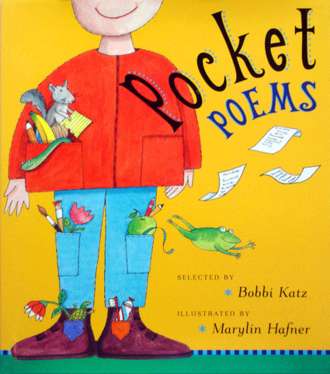Even though poetry isn't directly stated in the CCSS, poetry is still important for developing thinking!
The Runaway by Bobbi Katz
I made peanut butter sandwiches.
I didn’t leave a mess.
I packed my shell collection
and my velvet party dress,
the locket Grandma gave me
and two pairs of extra socks,
my brother’s boy scout flashlight
and some magic wishing rocks.
Oh, they’ll be so sorry.
Oh, they’ll be so sad,
when they start to realize
what a nifty kid they had.
I’d really like to be here
when they wring their hands and say,
“We drove the poor child to it.
She finally ran away.”
If I peeked through the window
I’d see them dressed in black,
and hear them sob and softly sigh,
“Come back, dear child! Come back!”
The house will be so quiet.
My room will be so clean.
And they’ll be oh so sorry
that they were oh so mean!
Poem by Bobbi Katz. Taken from The Kingfisher Book of Family Poems by Belilnda Hollyer, editor. Illustrated by Holly Swain. New York
Poem taken from http://bkatztx.tripod.com/id35.html
Close Reading:
Unpack the poem by going back to the text and share thinking to develop a class discussion.
- Thinking aloud about things that matter (practical as well as meaningful)
- See her attitude or how she feels (not just by what she says, but how she says it)
- How do you know she is a she?
- Who are "they"? How do you know? (Are there clues that tell you?)
- What is this poem *really* about?
Read Aloud
- If you usually do a read aloud during snack time, great! Don't get rid of it! But that might not be the best time to do a purposeful interactive read aloud. (Unless your kids somehow can multitask writing and thinking work along with eating a snack.)
- Typically 15-20 minutes every day.
Listen
Think
Notice
Read Aloud: My Name is Yoon by Helen Recorvits
1. Introduce the book
2. Read aloud with thinking aloud and accountable talk
3. Class conversation (Start with, "Talk to you neighbor about what you are thinking right now.")
*Teacher reaction was non-judgmental (If we want kids to think deeply and differently, then we need to allow for that) It's OK if the conversation goes a different way than you had expected. Just make sure to bring it back to the question, "How do you know?" Have kids show the place in the book that made them think that.
Ways to support conversation:
- Remove yourself from the circle, then whisper in to kids to coach
- Have kids start with partners or book clubs, then coach in to groups
- "What I heard you say was ____. Is this right?"
- Have your conferring notes with you during read aloud. You can gather information about readers during this time too!
- Sometimes for whole class conversation you might want a class list to mark how many times kids talk
Planning and integrating into mini lessons and small groups and conferences
- Think about the skills, but think aloud the strategies you are using
- Look at your notes to determine how kids are thinking already
Planning a Read Aloud (Make sure to make it feel natural, even if it is planned)
- Makes a post-it with "TA" in corner when she plans to think aloud for the class, along with the thought in a deliberate way that scaffolds the way she wants kids to think.
- Might have a TA that naturally lends itself to a Turn-and-Talk (TT)
- SJ = Stop-and-Jot
- Act it out
- Post-its in the back to plan for possible conversation:
- Ex: Let's talk long about this book...
- What are you thinking?
- Why do you think Yoon changed her mind about school?
- How do we know how Yoon feels...
- Skills/Strategies/Behaviors you might want to consider
- Notice actions
- Notice feelings
- Look for patterns
- Notice reactions/relationships
- Notice a conflict or change
- Stop when you are surprised!



No comments:
Post a Comment